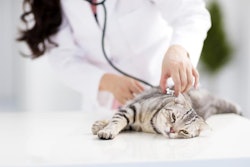Treat rewards often serve as a bonding mechanism for many pet owners and their pets. As early as puppy and kittenhood, treats are typically incorporated into a pet's daily lifestyle for positive reinforcement and training purposes. But too much positive reinforcement from treats can have negative consequences.
In the Association for Pet Obesity Prevention's most recent clinical survey, 56% of dogs and 60% of cats were diagnosed as overweight or obese. This is of significant concern because obese pets are at a greater risk of developing chronic diseases such as osteoarthritis, and a decreased lifespan.
Many well-intentioned pet owners are unaware of the excessive amounts of calories that some snacks provide. For example, two tablespoons of smooth peanut butter contain 190 calories approximately equal to the number of calories that a 5lb dog should consume in an entire day.
Other health concerns associated with treats have been identified:
- Dehydrated food items derived from animals (i.e. pig ears) have been implicated in Salmonella outbreaks. This poses a public health risk for both pets and people.
- Excessive intake of treats can unbalance a complete and balanced diet, leading to nutritional deficiencies and/or toxicities.
- Tough, rigid treats can cause periodontal damage and fractured teeth.
- Large, poorly digestible items such as rawhide bones can result in intestinal blockages.
How then can we safely reward our pets without compromising their health and safety? Here are a few tips.
- Limit the intake of treats to less than 10% of the pet's total energy intake for the day. This will reduce the risks of unwanted weight gain and an unbalanced feeding plan.
- Avoid treats that are prone to fragmenting, such as bones.
- Opt for low-calorie options such as carrots, green beans, or cucumbers. To obtain calorie information of typical household commodities, visit the USDA Food Database: https://ndb.nal.usda.gov/ndb/
- If your pet is begging, consider a healthier alternative such as a play session or cuddle time.
- Consult with your veterinarian if you have any questions regarding the safety of any particular treat item.
Positive interactions with our pets can come in many forms. We will enjoy their company longer when our interactions promote a healthy lifestyle. Talk to your veterinary team for more helpful tips and ideas when providing treats to your pet.














